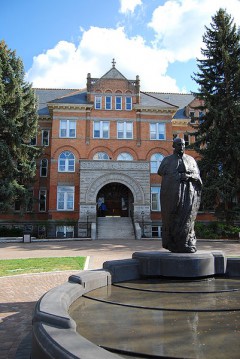
On Sunday, Gonzaga University students of faith came together as a student body for an annual tradition of Mass on the grass overlooking Lake Arthur. The homily was declared by the Rev. Janeen Steer, a coordinator in University Ministry. Steer spoke of an empty love that we as a student body, community, and society fall victims to. Awe struck, the significance of her words pierced my heart with truth. She referenced, “Jesus did not tell his followers that they had to agree with him… he asked them to follow him.” I was reminded of a verse I hold dear to my heart, which states, “Now that you have purified yourselves with obeying the truth so that you have sincere love for one another, love each other deeply from the heart” (1 Peter 1:22). When I question love, in its divine purity, I remind myself that to offer your heart, is to offer your desire, not your demand.
An integral aspect of Gonzaga’s Jesuit philosophy is educating the holistic student — mind, body, and spirit. Yet, influenced, manipulated and coerced, students fall trapped to an empty love that embodies disrespectful traits. How do we respect ourselves with the justice we deserve, and live in ‘college?’ If Jesus called us to be of the world but not in the world, then how can we associate his miracle of turning water into wine as an invitation for indulgence in our worldly aspirations, or in common language — party as Jesus partied (speaking from a college student’s perspective)? The empty love Steer spoke of provokes feelings of shame, loneliness, and guilt which follow after nightly college escapades.Though we are inherently selfish, we are called into intimate, vulnerable fellowship amongst one another. In a spiritual conversation I had recently about purity, the notion of justice to oneself and thy other was discussed. Though, I further ask, are we doing God justice? Our we doing selfless justice to one another? Conviction weighs heavy on our hearts, and feelings of worthlessness captive our minds, as they draw us away from the truth that we justly deserve. Our souls long to be romanced by an intimate fellowship with the divine.
God’s mercy is graciously given to us through forgiveness — if we can’t forgive ourselves, then how can we ask God to forgive us? Thus, “If you think you are standing strong, be careful not to fall. The temptations in your life are no different from what others experience. And God is faithful. He will not allow the temptation to be more than you can stand. When you are tempted, he will show you a way out so that you can endure” (1 Corinthians 10:12-13). We deserve love. We hope, live in faith, and receive the grace bestowed upon us, in, by, and through love in its purity. In purity of mind, body, and spirit, St. Ignatius of Loyola said, “Go forth and set the world on fire.” We are called to love in Christ's truth: love. Let us love.









